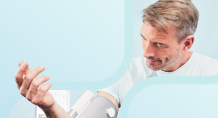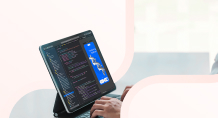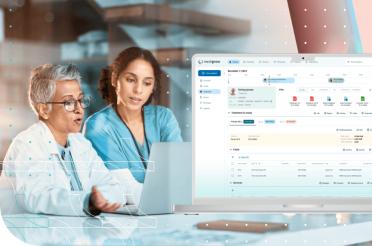Has healthcare changed vastly in the last few years? At its core – no, healthcare is still for making people’s lives easier. Nevertheless, the current healthcare system is far different from 20 years ago.
The driving force of innovative digital health solutions like patient apps causes this transformation. Now we see so many advances in technology in the face of patient apps affirming their position in the market. Their presence led to clever decisions and unexpected opportunities.
The patient app boom
Inflexibility, high costs, and workforce shortage – these were just some of the problems of the healthcare system when COVID-19 shook the world when we saw a boom in free medical apps for patients. In this uncertain period, 90,000 apps were created just for 2020.
This number means that there were 250 new entries every day. The global mHealth apps market size reached USD 43.5 billion in 2022.
The pandemic paved the way for many health tech companies and proved the importance of digital solutions. Healthcare professionals face a gap between their skills and the growing demands of IT and behavioral research. To bridge this, they turn to experienced specialists for support.
The good news is that advanced IT tools are stepping in to transform the industry! Healthcare providers, pharmaceutical companies, and Contract Research Organizations (CROs) now have powerful digital solutions to streamline their work and improve patient care.
Mobile health apps showed that the future of healthcare is digital and it is as close as your phone. They aim to return the trust of the patient in healthcare institutions and make healthcare more approachable. Do not forget that this process occurs only by adding value that saves lives today.
What are medical apps for patients
Medical apps are mobile applications that help people take control of their health straight from their phones or tablets. They let users track vital signs, schedule doctor’s appointments, set medication reminders, and even chat with healthcare providers.
These apps make it easier to stay on top of health needs, giving people reliable tools and info to manage their well-being. Plus, they follow strict security and privacy rules to keep personal health data safe.
Types of patient apps
Medical apps for doctors and patients come in many forms, each designed to improve different aspects of health and wellness.
Below you can see some of the more widely spread types of patient apps.
Health monitoring apps

Health monitoring apps are making it easier to track everyday well-being. With a smartphone or wearable, users can check heart rate, sleep patterns, and activity levels in real-time.
Apps like Fitbit and Apple Health turn daily habits into useful insights. Whether improving fitness or monitoring heart health, these tools put people in control of their health data.
Technology is driving their rise. Smartwatches and fitness trackers sync with apps like Google Fit and Samsung Health, giving a full picture of health. Runners and cyclists rely on Strava to track progress. Those focused on nutrition use MyFitnessPal to log meals. These apps help users set goals, adjust routines, and stay on track.
Beyond personal health, these apps are shaping the future of healthcare. Best healthcare apps collect patient data that helps researchers, improves treatments, and keeps patients engaged. Millions of people use them daily, creating valuable insights into health trends. As digital tools evolve, health monitoring apps are becoming a key part of everyday life.
Medication management apps
Medication management apps help people take their medicine correctly and on time. They send medication reminders and track doses. Also, they provide important details about prescriptions.
For example, the Medisafe app alerts users when it is time for a pill and even notify family members if a dose is missed. For those juggling multiple medications, these tools bring order and peace of mind.
Many apps offer more than just reminders. For instance, PillPack organizes medications and delivers them in pre-sorted packets. This makes daily routines easier. Moreover, the app MyTherapy combines tracking with a digital health journal, which allows users to record symptoms and share updates with doctors. Some apps even check for drug interactions to help people avoid dangerous combinations.
Medication management apps are changing how people handle their health. They support different classes – elderly patients, busy professionals, and those with chronic medical conditions. By reducing missed doses and improving adherence, they help treatments work better. As technology improves, these apps will become even smarter, giving users more control over their well-being.
Telemedicine and virtual consultation apps
Telemedicine apps bring doctors and patients together without the need for travel. They offer quick access to medical advice, prescriptions, and follow-ups with different tools and functionalities.
For example, Teladoc Health and MDLIVE apps connect users with licensed doctors through video calls or chat. People can get help for common illnesses, chronic conditions, and even mental health concerns from the comfort of their own homes through their mobile devices. This makes healthcare easier, especially for those in remote areas or with busy schedules.
Virtual consultation apps do more than save time. They reduce hospital visits and lower healthcare costs. Moreover, Babylon Health uses AI to assess symptoms before a doctor visit. This also saves doctors time and reduces their burden. Some apps even link directly to pharmacies for faster filling of prescriptions.
Telemedicine will continue to change how people receive medical care, especially when it is implemented in patient apps.
Fitness and wellness apps
Fitness and wellness apps help people stay active and build healthy habits. These are some of the most commonly used apps. They offer workout plans and track progress.
For example, Nike Training Club and FitOn give guided exercises for all fitness levels. MyFitnessPal helps users log meals and count calories. Some apps, like Strava, turn running and cycling into a social challenge. With the right app, anyone can take charge of their health.
Who does not want an easier way to stay fit? Fitness and wellness apps make staying healthy simple, accessible, and even fun.
Mental health support and therapy apps
Can a mobile health app improve mental well-being? Many users say yes.
Mental health and therapy apps give people support whenever they need it. They offer guided meditation, mood tracking, and professional therapy sessions.
There are many examples of mental health apps that offer different support. For example, Headspace helps users relax with simple breathing exercises. On the other hand, BetterHelp connects people with licensed therapists through chat or video calls.
Moreover, Woebot uses AI to chat with users and offer cognitive behavioral therapy techniques. For those dealing with stress, anxiety, or depression, these apps provide comfort and guidance.
Chronic disease management apps
Chronic diseases torture many people worldwide. This is why some patient apps are specially developed to help chronically ill patients. Chronic disease management apps help people take control of their long-term health conditions. They track symptoms, monitor vital signs, and remind users to take medication.
For example, the app MySugr helps diabetics log blood sugar levels and understand patterns.
The right medical app for chronic illness provides support at every step. For instance, CareZone organizes medication schedules and health records in one place. Also, Propeller Health helps asthma and COPD patients track inhaler use and avoid triggers. These apps have the opportunity to improve daily life and make treatment more effective.
Pregnancy and parenting apps
How do new parents keep up with so much information? The right femtech makes it easier. Some apps track feeding and sleep schedules. This helps parents understand their baby’s needs. Others offer a community where parents share experiences and ask questions.
For example, the app called What to Expect helps expecting mothers follow their pregnancy week by week. The Wonder Weeks explains baby growth phases and developmental leaps. These apps give parents the confidence to navigate pregnancy and early childhood.
Nutrition and diet tracking apps

Nutrition and diet tracking apps help people make better food choices. They are closely related to fitness apps and some of them are even a combination of the two. They track calories and break down nutrients. Moreover, some of the nutrition and diet apps suggest meal plans.
The app MyFitnessPal lets users log meals and see how they affect health goals. On the other hand, Lifesum offers personalized diet plans based on lifestyle and preferences. These apps turn healthy eating into a simple, daily habit.
Appointment scheduling and reminder apps
How often do people forget important medical appointments? Appointment scheduling and reminder apps help prevent that. They make it easier to manage healthcare visits. These apps allow users to book appointments with doctors, dentists, and specialists directly from their phones.
Apps like Zocdoc help patients find available time slots and choose healthcare providers based on reviews. MyChart is one of the best appointment scheduling apps. It allows patients to schedule appointments, view test results, and receive reminders about upcoming visits.
These tools save time and reduce the stress of managing healthcare schedules. Appointment scheduling and reminder apps simplify life by ensuring people never miss a check-up or treatment.
Use cases – Medisafe Pill & Med Reminder
Medisafe Pill Minder and Tracker stand out as an award-winning medication platform, offering a high level of customization for various dosing schedules and notification sounds.
Beyond simple pill reminders, the free app provides valuable features such as drug interaction warnings. This means that it alerts users of potential complications when combining medications. This feature is particularly beneficial, allowing individuals to review concerns with their healthcare providers.
The Medisafe Pill Minder and Tracker app goes a step further – it offers family scheduling and tracking capabilities. This gives the patients the opportunity to monitor their loved one’s medications, measurements, and appointments in one centralized location. This inclusive approach ensures that caregivers can stay informed, even receiving notifications if a dose is missed.
Medisafe also facilitates seamless communication with healthcare providers through its doctor communication feature. Users can easily send detailed medication reports to their healthcare professionals before scheduled appointments. Imagine having efficient and informed discussions with your doctor without having to explain every single detail of your health history.
Moreover, Medisafe incorporates measurement trackers, allowing users to monitor over a dozen health measurements. This data can be conveniently shared with healthcare providers, enhancing the collaborative aspect of healthcare management.
Overall, Medisafe Pill Minder and Tracker provide a comprehensive and user-friendly platform for effective medication management and health tracking.
Benefits of healthcare apps
Patient apps offer multiple benefits for healthcare providers, contributing to a more engaged and empowered patient population.
Benefits for the healthcare providers
The best mobile healthcare apps enhance patient engagement. This is a notable advantage, as these apps encourage active participation in healthcare. This is possible through tools for self-monitoring, health education, and personalized health plans.
This heightened engagement can lead to more informed and motivated patients who actively participate in their healthcare journey. This is extremely important in both physical and mental health conditions.
Moreover, patient apps contribute to better patient outcomes by facilitating continuous communication between patients and healthcare providers. This continuous connection supports improved disease management and leads to adherence to treatment plans and overall enhanced health outcomes.
The integration of patient apps also plays a crucial role in cost reduction. Remote monitoring and early intervention, made possible by these apps, lead to cost savings. This is mainly through preventive care, reduced hospital admissions, and optimized resource utilization.
Furthermore, such apps enhance care coordination among healthcare professionals, fostering seamless information sharing and collaborative care delivery, particularly in complex cases. This contributes to the overall efficiency and effectiveness of healthcare services, making patient apps transformative tools that benefit individuals and contribute to a more patient-centric healthcare system.
Benefits for healthcare delivery and patient empowerment
The impact of patient apps goes beyond the provider-patient relationship, significantly influencing healthcare delivery and patient empowerment.
Patient apps play a crucial role in breaking down geographical barriers by offering virtual consultations and health services. This ensures increased access to healthcare for individuals in remote or underserved areas, expanding the reach of healthcare services.
Patient apps empower individuals to actively participate in managing their health conditions. They facilitate real-time monitoring of symptoms, medication adherence, and lifestyle factors, contributing to more effective disease management and personalized care.
Another aspect of patient apps is that they serve as valuable sources of accessible health information, promoting health literacy. They empower individuals to make informed decisions about their health and well-being, fostering a more knowledgeable and engaged patient population.
Patient App Development Roadmap

The roadmap for building a patient app consists of several main points. These are the essential details that a company in healthcare, a healthcare professional, or a medical institution should consider when thinking about creating a digital health solution.
If you don’t have the experience, you should trust experienced technology companies that could lead you through the process.
SCRUM: The methodology for innovators
The Scrum method is all about helping teams make smarter decisions. It encourages co-workers to learn through experiences and reflect on their ups and downs. This leads to seeking constant improvement. Scrum methodology requires strong self-motivation and self-organization. It benefits individuals who know what, how, and when to do a specific task.
The Scrum framework supports product and service development in every project, no matter its complexity. To achieve goals and objectives, teams should follow some basic rules. First, they need to ensure transparency in communication between the members. Second, they must create an environment of collective accountability. This correlates closely with the first rule. Good communication means everyone feels heard and is part of the team. This creates the spirit of the team.
Third, continuous progress is based on experience. It relies on continuous learning and adjustment to fluctuating factors.
Scrum is structured to help teams adapt to changing conditions and re-prioritize objectives. It provides the perfect environment for the digital health industry by ensuring flexibility and transparency.
Define the Problem: The Gap in The Healthcare System
Now is the time for the questions everybody asks:
- What problem does your app solve?
- What are these fundamental challenges that the healthcare system is dealing with?
- How does this app improve the patient pathway?
The right approach to answer is to look at the bigger picture. Then, you might move to a more specific approach. For example, what niche do you want to enter? You can have a specific aim or group of patients that you want to help. Next, you have to think about what these people need and how you can give it to them.
It is essential to note that the biggest challenge is to cooperate with the team developing your patient app. The medical experts and tech gurus are from entirely different worlds. For that reason, you should carefully choose your digital solutions provider. Look for a partner with proven expertise, an innovative team of professionals, and a vision for the future in healthcare.
BGO Software expertise
In 2018 we managed to build Healthsuite – a patient app that provides effective digital therapies for inflammatory conditions. In this case, both Ampersand Health and BGO Software focused on improving patient outcomes when fighting long-term inflammatory conditions.
Here are some of the values that this app brings:
- Customizable personal health record. That keeps all of the patient’s information in one place, from the hospital, wearable devices, trackers, and outcome measures.
- Support and guidance. Patients can get advice from the hospital team remotely and users access the Crohn’s & Colitis UK helpline whenever they need some support.
- Latest research section. Where people can find practical advice, tactics, and the latest research in the self-management library and personalized feed.
- Set up a reminder option. For medication and appointments, find out more about local events and support groups.
Challenges during development
Even though you may know what kind of app you are making, it is still essential to note that there are challenges that will be present during the development process. For example, ensuring the security and privacy of sensitive health data is paramount, demanding robust encryption and compliance with regulations like HIPAA and GDPR. Navigating complex healthcare regulations, including HIPAA and FDA guidelines, is crucial for gaining approvals.
Interoperability issues arise due to the need for patient apps to seamlessly integrate with electronic medical records and other healthcare systems. Achieving this requires adherence to standardized data formats and communication protocols. Encouraging user engagement and adoption involves addressing concerns about data sharing, designing intuitive interfaces, and integrating features into users’ daily lives.
Ethical considerations, such as informed consent and transparency, are vital in mobile healthcare app development. Striking a balance between innovation and ethical practices ensures users are well-informed about data usage and biases. Successfully overcoming these challenges demands a collaborative approach involving developers, healthcare professionals, regulators, and users to create trustworthy, compliant, and user-friendly patient-facing apps.
A better understanding of what the obstacles are can help you overcome them as well. With that in mind, articles like these are exactly the extra information you need to get a better grasp on the topic.
In conclusion, patient apps already play and will continue to play a pivotal role in shaping the future of healthcare by promoting preventive care and enhancing overall health outcomes. The integration of innovative technologies with patient-centric care empowers individuals to actively manage their health and well-being. According to some healthcare experts, innovations in healthcare will fight over bureaucracy and bad management.
Thanks to our experience in the field, we at BGO Software believe that if your idea offers value and the improvement of the patient’s experience, you will find success in the industry. But even then it is crucial to collaborate with the right IT partner who will help you reach your goals.
Sources
https://www.m3global.com/blog-the-rise-of-digital-health-tracking-apps.html














